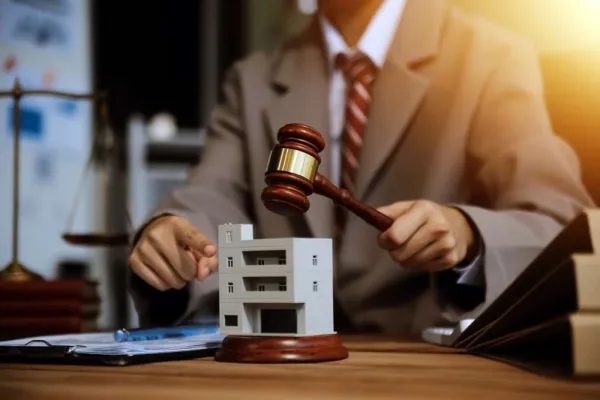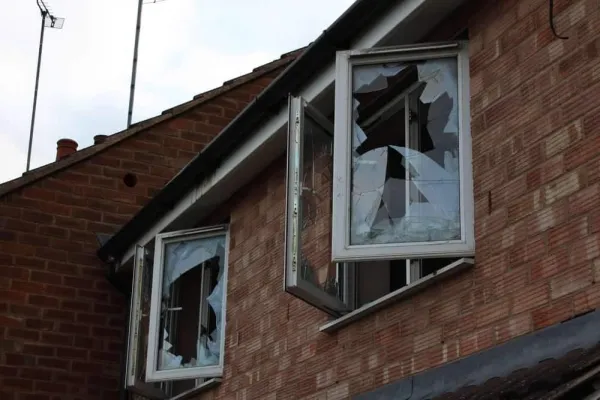When your house gets vandalised, it’s not a pleasant feeling
Especially if you don’t know who did it or even why.
Either way, there are steps you should take.
What counts as vandalism on a property?
Vandalism is when someone deliberately damages your property.
It usually refers to small examples of damage, rather than major ones. For example, a small fire can be described as vandalism, while a large fire is arson.
It differs from accidental property damage. For example, someone accidently crashing into your wall is not vandalism. But someone intentionally doing the same thing is.
Vandalism not only reduces a property’s value, but carries a psychological impact on the homeowner. And if it’s a regular occurrence, it must be disclosed with a sale.
Graffiti
Graffiti is probably the most common example of vandalism.
This is when someone spray paints words or images onto your property.
This is often seen with properties in the public eye. Perhaps someone famous lives there. Or maybe it’s a landmark building in a city centre.
Sometimes, it’s easy to remove this vandalism. But in other cases, it can be hard work and powerful cleaning tools and paint are needed to remove it.
Fly tipping
This is when someone dumps rubbish onto your property.
This may be because they know you personally and want to make your life difficult.
Or perhaps they’re travellers who don’t want to dispose of their rubbish in the ‘correct’ way.
Fly tipping can be unsightly and give a horrible smell. In the largest cases, it’s difficult to remove it by yourself.
Smashing windows, doors or fences
Any small levels of damage to your property are considered vandalism. This includes breaking a window, a door, or a fence.
This can also create wider issues, if your home is temporarily unsafe because there’s a way in.
Damaging cars
Items that you own at the front of your property can still fall under the category of vandalism.
Especially if it’s parked on land that you own, such as a driveway.
Even damaging the paint of your car (such as by keying it) counts as vandalism.
Which houses are most vulnerable to vandalism?
Well-known landmarks
Vandals are keen to leave their mark on well-known landmarks.
Especially places with a high foot traffic, such as national monuments that aren’t well-protected.
The busiest buildings will usually have security and cameras. In this case, vandals could stay away.
But if it’s a building with a renowned history, or lacking in security, it could be a target.
High crime urban areas
In neighbourhoods with a high crime rate, vandalism is more common.
This is often seen in urban areas. It’s often described as a ‘petty crime’, meaning that it’s not as serious as some other types of crime.
And criminals may thus feel comfortable indulging in it.
If your home is in a location like this, it’s worth installing visible cameras. This could deter potential vandals.
Empty buildings
Abandoned and empty buildings are vulnerable to vandalism.
This is because vandals know that there won’t be many repercussions if they do damage to it.
Likewise, empty buildings are the most vulnerable to squatting.
And squatters are one of the most common causes of vandalism to a house.
Properties without any cameras
This is linked to the example listed above. Vandals feel safe when they know that they won’t be caught.
A visible camera presence on your property keeps them away, because they know you’ll have proof of what they’ve done.
But if your house doesn’t have any visible cameras, it’s more likely to be subjected to vandalism.
In this case, buying security cameras may be seen as an investment. Even if it doesn’t feel that way at the time.
What to do if someone vandalised your property
Report it to the police
Your first step should be to report the incident to the police.
They can file a police report and give you a crime reference number. This may be useful in a court of law, if it gets that far.
You should especially call the police if the situation is urgent.
This might be because you feel threatened. Or perhaps the person is still in the vicinity.
Gather evidence of all the damage
Take photos and videos of all the damage that’s occurred.
And if you’ve got security cameras, you should make sure to gather all the footage of the vandals on your property.
Make sure to store this in a safe way. And get back-up copies. Take a note of the time and date when the vandalism occurred.
And if you report it to the police, ask for their report (if applicable), along with a crime reference number.
Speak to your insurance company
If you’ve got home insurance, then this may cover vandalism to your property.
You should speak to your insurance provider to confirm this.
They will want the crime reference number. Then, you can make a claim and find out if they’ll help to cover the damages.
Report it to your local council, if necessary
You don’t always have to do this. In some cases, though, it could give you peace of mind to inform the council. Especially since some local bodies help in this area.
For example, they could have street camera footage that you can utilise for evidence.
Or they will certainly want to know if your property is a listed building, or you live in a protected area.
Get expert legal advice
It’s important that you speak to a qualified legal expert.
They can guide you on whether you have the option of taking the vandal to court.
This will need enough evidence and sufficient damages that you won’t make a loss.
They can advise you on any extra steps you need to take. And they can then represent you in the court case itself.
Consider taking the matter to court
Even if you’ve got lots of proof about what happened and who did it, you might feel that it’s not worth taking it to court.
Perhaps the vandalism was done by someone who is no longer in the area.
Or maybe the damage was nominal, and it would cost you too much in expenses. Your legal expert can offer guidance on these matters.
Can I use neighbour’s camera footage to prove vandalism?
Yes, you can. There’s no law preventing this.
You will need to get their permission to use it. This includes details about when it was taken, and where. They may need to act as a witness, too.
Speak to your legal adviser to know more.
















